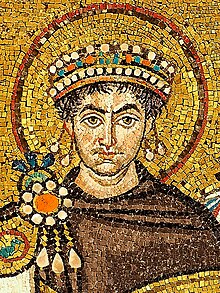Justinian I

Justinian I (Latin: Flavius Petrus Sabbatius Iustinianus; Greek: Ἰουστινιανός Ioustinianos; 482 – 14 November 565), also known as Justinian the Great, was the Eastern Roman emperor from 527 to 565.
| This article about a monarch is a stub. You can help out with Wikiquote by expanding it! |
Quotes about Justinian I
[edit]- Procopius wrote, "Now such was Justinian in appearance; but his character was something I could not fully describe. For he was at once villainous and amenable; as people say colloquially, a moron. He was never truthful with anyone, but always guileful in what he said and did, yet easily hoodwinked by any who wanted to deceive him. His nature was an unnatural mixture of folly and wickedness. What in olden times a peripatetic philosopher said was also true of him, that opposite qualities combine in a man as in the mixing of colors. I will try to portray him, however, insofar as I can fathom his complexity.
This Emperor, then, was deceitful, devious, false, hypocritical, two-faced, cruel, skilled in dissembling his thought, never moved to tears by either joy or pain, though he could summon them artfully at will when the occasion demanded, a liar always, not only offhand, but in writing, and when he swore sacred oaths to his subjects in their very hearing. Then he would immediately break his agreements and pledges, like the vilest of slaves, whom indeed only the fear of torture drives to confess their perjury. A faithless friend, he was a treacherous enemy, insane for murder and plunder, quarrelsome and revolutionary, easily led to anything, but never willing to listen to good counsel, quick to plan mischief and carry it out, but finding even the hearing of anything good distasteful to his ears."
- Procopius trans. by Richard Atwater, in Procopius, Secret History (1927)
- Certainly in architectural brilliance and innovation alone his age deserves to be rated as a great one. Haghía Sophia, one of the greatest achievements of Christian, or human, architecture, and the Corpus juris civilis, a supreme landmark of Roman, and European, Law, stand forth as Justinian's most enviable monuments. What ruler could hope to leave finer ones?
- John W. Barker, Justinian and the Later Roman Empire (1966), p. 184.
- Justinian was the last of the great Roman Emperors. He reunited the Mediterranean world, issued a code that remained the basis of law for a thousand years and patronized magnificent works of art and architecture. At the same time, he was a revolutionary who wanted to transform society and who tolerated no deviation. His powerful wife, Theodora, mitigated some of his policies but made others more vicious, crushing anyone who might stand in the way of the imperial couple. Although Justinian's Empire did not last, his laws and buildings formed an enduring heritage.
- Clive Foss, The Tyrants: 2,500 Years of Absolute Power and Corruption (2006), p. 40
- Justinian had many detractors – for he did not care whom he trampled over as he attempted to rebuild his empire in the aftermath of the barbarian conquests. The writer Procopius called him a demon in disguise, who had the blood of one thousand billion men on his hands; who ‘cheerfully banished wealth from Roman soil and became the architect of poverty for all.’ Yet for others, particularly those who did not have to deal with him at first hand, Justinian was a totemic emperor who deserved mention in the same breath as Augustus and Constantine.
- Dan Jones, Powers and Thrones: A New History of the Middle Ages (2021), pp. 85-86
- Justinian is said to have restored one hundred and fifty cities in Africa, some of which had been altogether, and others extensively ruined; and this he did with surpassing magnificence, in private and public works and embellishments, in fortifications, and other vast structures by which cities are adorned and the Deity propitiated: also in aqueducts for use and ornament, the supply of water having been in some cases conveyed to the cities for the first time, in others restored to its former state.
See also
[edit]External links
[edit]![]() Encyclopedic article on Justinian I on Wikipedia
Encyclopedic article on Justinian I on Wikipedia
